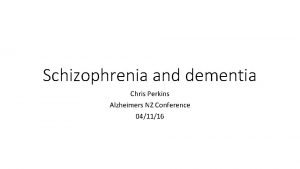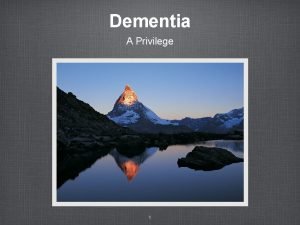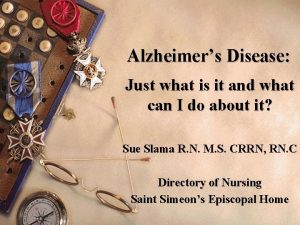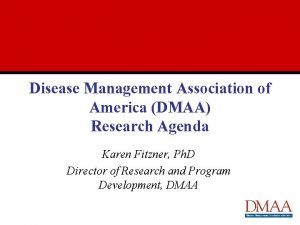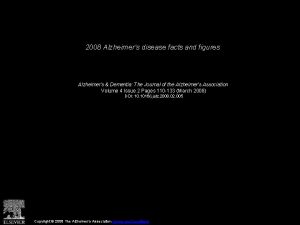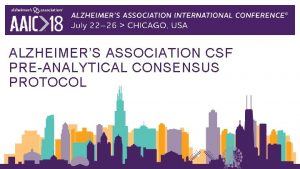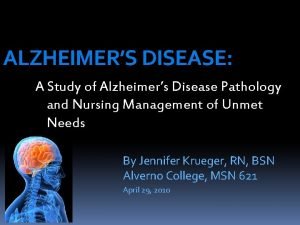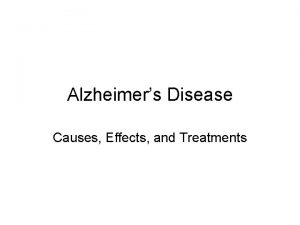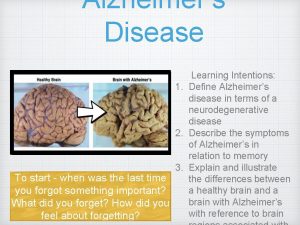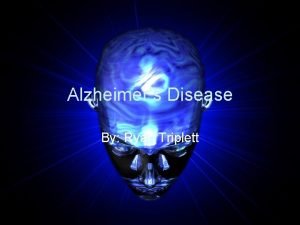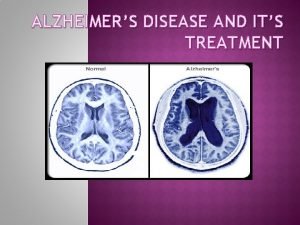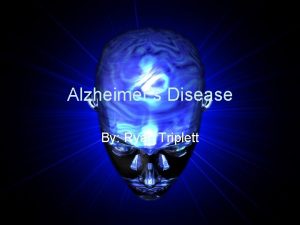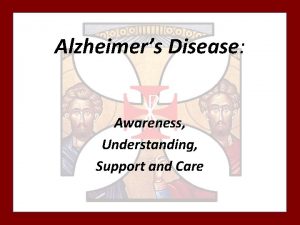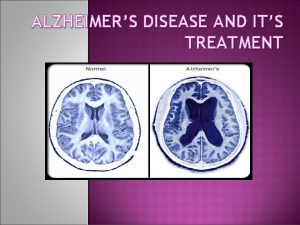ALZHEIMERS DISEASE Alzheimers Association 2012 Alzheimers Disease Facts















- Slides: 15

ALZHEIMER’S DISEASE

Alzheimer’s Association 2012 Alzheimer’s Disease Facts 2012 Costs of Alzheimer’s 200 Billion Medicaid Medicare $35. 5 b $ 104. 5 b Out of Pocket $33. 8 b

Alzheimer’s Association 2012 Facts and Figure � 5. 4 million American live with Alzheimer’s Disease � One in eight older American have Alzheimer’s � Payment for care estimated at $ 200 Billion � In 2011, 15. 2 million family and friends provided 17. 4 billion hours of unpaid care estimated $210. 5 billion � Alzheimer’s disease is the 6 th leading cause of death in the United States � Deaths from Alzheimer’s increased 66 % between 2000 and 2008.

More Facts about Alzheimer’s � � � The American Health Assistance Foundation states that the average annual cost for an assisted living facility is $37, 572. The Alzheimer’s foundation of America states that Alzheimer’s disease costs U. S. businesses more than sixty billion dollars a year, consisting of lost productivity and insurance costs Total worldwide societal costs were estimated to be US$ 315 million in 2005

Stages of Alzheimer’s Disease � Early symptoms of Alzheimer's disease include memory problems, trouble learning , and retaining new information � Moderate stage of the disease systems include cognition and function problems � Severe stage, there is a full dependence on care gives for all aspects of daily living. For example, help with bathing, eating, and putting on clothes

Medication for Alzheimer’s Disease � � � There are two classes of medications that are FDA approved for Alzheimer’s disease, Cholinesterase inhibitors and Memantine, These drugs have shown to have a short term symptomatic benefit which represents a temporary delay in disease severity

Medication for Alzheimer’s � � � � Donepezil is a noncompetitive, reversible inhibitor of acetylcholinesterase. Placebo-controlled trials indicate that the clinical efficacy of is similar to that of rivastigmine and galantamine Galantamine is a reversible, competitive inhibitor of acetylcholinesterase. Improvements in ADAS cog score appear to be very similar to those with rivastigimine and donepezi. Rivastigmine is a reversible, noncompetitive inhibitor of acetylcholinesterase. The clinical efficacy of rivastigmine in patients with mild to moderate Alzheimer disease has been demonstrated in a number of clinical trials Memantine is a moderate- affinity uncompetitive NMDA antagonist(. Memantine has been shown in clinical trials to be beneficial in treating moderate to severe Alzheimer’s disease

Controversy over Medication � � � Different Countries differ in the usage of these drugs. For instance, The American Psychiatric Association and American Association of Geriatric Psychiatry recommend using CHEIs for mild-tomoderate stages of AD, and reserving the NMDA receptor antagonist for the sever stage of the disease. In contrast, The National Institute for Clinical Excellence that helps with guidance for the United Kingdom National Health Service, recommends only using the CHEIs use for moderate to severe use, and reserves the NMDA receptor antagonist for clinical trials due to the cost and limited benefit

Reasons for Controversy � � Defining treatment response in Alzheimer disease is more challenging than other disease for several reasons. First, because Alzheimer is a degenerate disease which means that many patients may not be able to clearly express their symptoms, which results in biased proxy ratings given by their care givers Second, the natural history of the disease is one of gradual decline, which means that maintenance of abilities, even if not producing symptomatic improvement, can be regarded as a treatment success. Third, it is hard to find a measuring scale that correctly captures all aspects of the disease, such as changes in cognition, behavior, and function

Why I Disagree with NICE � � � � Preventing these drugs until someone reaches the moderate stage of the disease is not very cost effective. Usually when someone reaches a moderate level of Alzheimer’s they acquire more cost. For example, The cost of caring for someone with Alzheimer’s disease is magnified in the more severe stages of the disease. The cost of Alzheimer’s disease increases with the severity of the disease. Drugs that have the capacity to stabilize the disease are a potential source of cost saving. In clinical trials these drugs have shown to decrease psychotic symptoms and arguable have shown to have some cognitive improvement. Because of these benefits it is possible to postpone full time care which reduces the economic burden on Alzheimer’s disease.

Future Treatment for Alzheimer’s � Recently, The United States Food and Drug Administration approved the � � drug Amyvid. According to the Alzheimer’s Drug Discovery Foundation, Amyvid is the first diagnostic test for Alzheimer’s disease. “This approval marks an important milestone for early detection, diagnosis, treatment, and patient care of Alzheimer’s disease and other cognitive disorders”.

Conclusion � Thanks to the new drug Amyvid there is now a way to positively identify Alzheimer’s disease in patients. Hopefully, one day we will find a cure for this terrible disease which not only affects patients, but their whole support system.



 Georgia alzheimers planning
Georgia alzheimers planning Fast score for dementia
Fast score for dementia Vaskulär demens
Vaskulär demens Alzheimers nz conference 2020
Alzheimers nz conference 2020 Site:slidetodoc.com
Site:slidetodoc.com Alzheimers society contented dementia
Alzheimers society contented dementia Alzheimer's eye test joke
Alzheimer's eye test joke Communicable disease and non communicable disease
Communicable disease and non communicable disease Disease management association of america
Disease management association of america Interesting facts about wilson's disease
Interesting facts about wilson's disease 64:8+9:9-63:7
64:8+9:9-63:7 Ydelsesbeskrivelse byggeri
Ydelsesbeskrivelse byggeri Iinn 2012
Iinn 2012 Remote desktop virtualization host role server 2012
Remote desktop virtualization host role server 2012 Multipoint dashboard
Multipoint dashboard Jayco sterling 2012
Jayco sterling 2012



